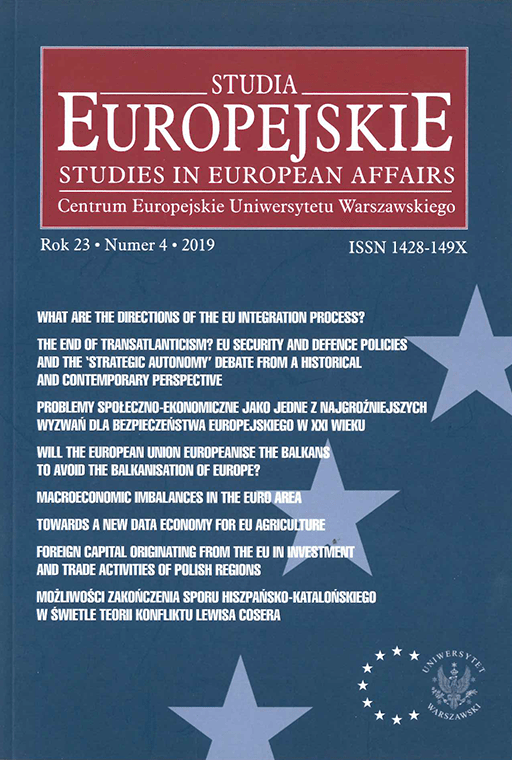
ISSUE: 4/2019
- Volume 23
- Number 4
- 2019
Subscribe NEWSLETTER
Studia Europejskie –
Studies in European Affairs
ISSN: 1428-149X
e-ISSN: 2719-3780
License
Articles published in the journal are under a Creative Commons Attribution – Non Commercial – No Derivatives 4.0 International License
What Are the Directions of the EU Integration Process?
Abstract
Just before the 2019 European Parliament (EP) elections many authors have indicated their exceptional nature. In this article the author attempts to analyze how these particular characteristics and first decisions taken after the elections by the key EU level actors may shape the EU integration process in the coming years. The article focuses on how the fragmentation of the EP may influence the choice of the European integration directions in the near future. One of the first observed effects of this fragmentation was the failure of leading candidates system during the appointment process of the Commission President. Another one is Ursula von der Leyen’s political programme for the European Commission, built on the strong awareness of the need to create a governing coalition between the EP and the European Commission. Acknowledgment of the challenge of the EP diversity by the New Commission President may have a positive effect on the EU-level democracy, however with a decrease in the efficiency of the EP legislative process.
References
A New Social Contract for Europe. PES Manifesto 2019, https://www.pes.eu/export/sites/default/.galleries/Documents-gallery/PES-Manifesto2019_EN.pdf_2063069299.pdf (access 15.08.2019).
A Union that strives for more. My agenda for Europe. By candidate for President of the European Commission Ursula von der Leyen. Political Guidelines for the next European Commission 2019–2014, https://www.europarl.europa. eu/resources/library/media/20190716RES57231/20190716RES57231. pdf (access 15.08.2019).
Barigazzi J. et al., Von der Leyen tapped to run European Commission, “Politico”, 3.07.2019, https://www.politico.eu/article/eu-european-leaderspick-germany-defense-minister-ursula-von-der-leyen-to-lead-commission-charles-michel-council/ (access 2.08.2019).
Christiansen T., After the Spitzenkandidaten : fundamental change in the EU’s political system? “West European Politics”, June 2016, DOI: https://doi.org/10.1080/01402382.2016.1184414. EPP Group, Our priorities, https://www.eppgroup.eu/what-we-stand-for/our-priorities (access 15.08.2019).
A new strategic agenda 2019–2024, Press release, 20.06.2019, https://www. consilium.europa.eu/en/press/press-releases/2019/06/20/a-new-strategic-agenda-2019-2024/ (access 20.08.2019).
Fromage D., The 2019 European Parliament elections: Looking back and ahead, “Perspectives on Federalism”, No. 11(1)/2019, pp. 94–101.
Funke M., Schularick M., Trebesch Ch., Going to extremes: Politics after fi nancial crises, 1870–2014, “European Economic Review”, No. 88/2016, pp. 227–260, DOI: https://doi.org/10.1016/j.euroecorev.2016.03.006.
Halla M., Wagner A.F., Zweimeuller J., Immigration and Voting for the Far Right, “Journal Ofthe European Economic Association”, 15 (January)/ 2018, pp. 1341–1385, DOI: https://doi.org/10.1093/jeea/jvx003.
Herszenhorn D.M., de la Baume M., Ursula von der Leyen’s narrowly won homecoming, “Politico”, 17.07.2019, https://www.politico.eu/article/ursula-von-der-leyens-european-commission-president-narrowly-wonhomecoming/ (access 15.08.2019).
How different generations voted in the EU election, https://europeelects. eu/2019/06/03/how-different-generations-voted-in-the-eu-election/ (access 2.08.2019).
Inglehart R.F., Norris P., Trump, Brexit, and the Rise of Populism: Economic Have-Nots and Cultura Backlash, “HKS Faculty Research Working Paper Series”, RWP 16-026, August 2016.
Inglehart R.F., Modernization, Existential Security, and Cultural Change: Reshaping Human Motivations and Society, in: Handbook of Advanced in Culture and Psychology, Vol. 7, eds. M.J. Gelfand, Chi-Yue Chiu, YindYi Hong, Oxford University Press, Oxford 2018.
Inglehart R.F., The Silent Revolution, Princeton University Press, Princeton, NJ 1977. Leading academics on the European elections 2019, eds. N. Bolin, K. Falasca, M. Grusell, Nord L. Mittuniversitetet, Demicom, Sundsvall, Sverige 2019.
Manfred W., Better Europe, My Ideas, https://weber.epp.eu/my_ideas? locale=en (access 15.08.2019).
Priorities for 2019: What European Greens Fight For, https://europeangreens. eu/priorities-2019-what-european-greens-fight (access 15.08.2019).
Rydgren J., The Sociology of the Radical Right, “The Annual Review of Sociology”, No. 33/2007, pp. 241–261, DOI: https://doi.org/10.1146/annurev.soc.33.040406.131752.
Schminke T.G., How different generations voted in the EU election, 3.06.2019.
Schulmeister P., et. al, Closer to the Citizens, Closer To The Ballot. Spring Eurobarometer 2019, Eurobarometer Survey 91.1 of the European Parliament. A Public Opinion Monitoring Study, April 2019-PE 637.932.
Shackleton M., The Election of the Commission President in 2014: What Does It Tell Us about Democracy in the European Union, “ISL Working Paper”, No. 4/2014.
Spring Eurobarometer 2019, Eurobarometer Survey 91.1 of the European Parliament. A Public Opinion Monitoring Study. The European Parliament Elections of 2019, eds. L. De Sio, M. Franklin, L. Russo, Luiss University Press 2019.
Voss D., The Political Economy of European Populism: Labour Market Dualisation and Protest Voting in Germany and Spain, “LEQS Paper” No. 132/2018.
DOI: 10.33067/SE.4.2019.1
Language: English
Pages: 9-22
How to Cite:
Harvard
Zabłocka-Abi Yaghi, A. (2019) "What Are the Directions of the EU Integration Process?". Studia Europejskie – Studies in European Affairs, 4/2019, pp. 9-22. DOI: 10.33067/SE.4.2019.1